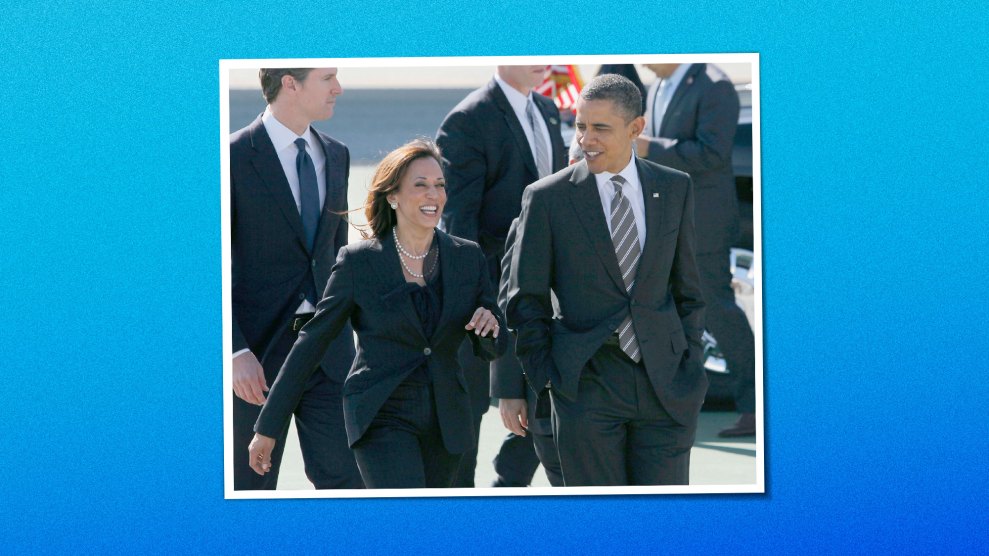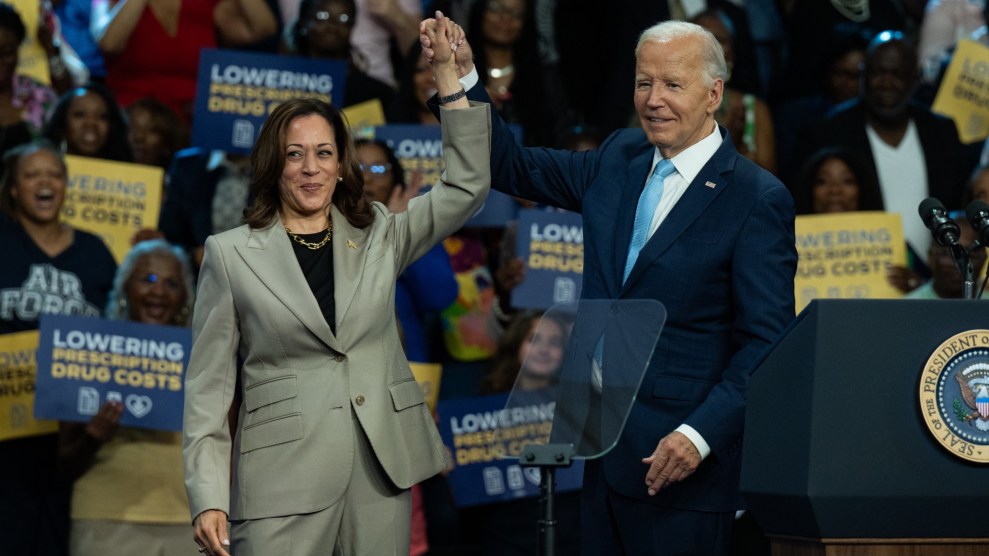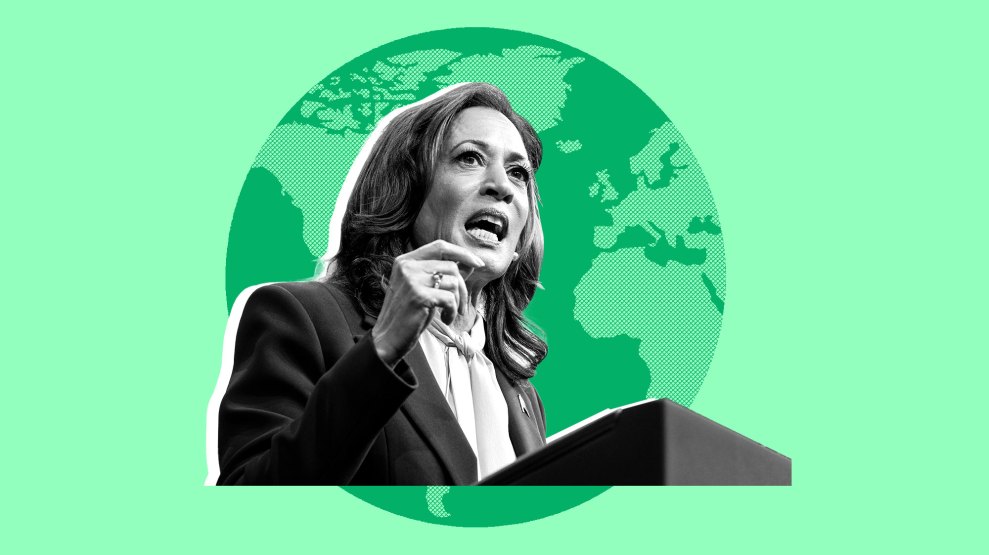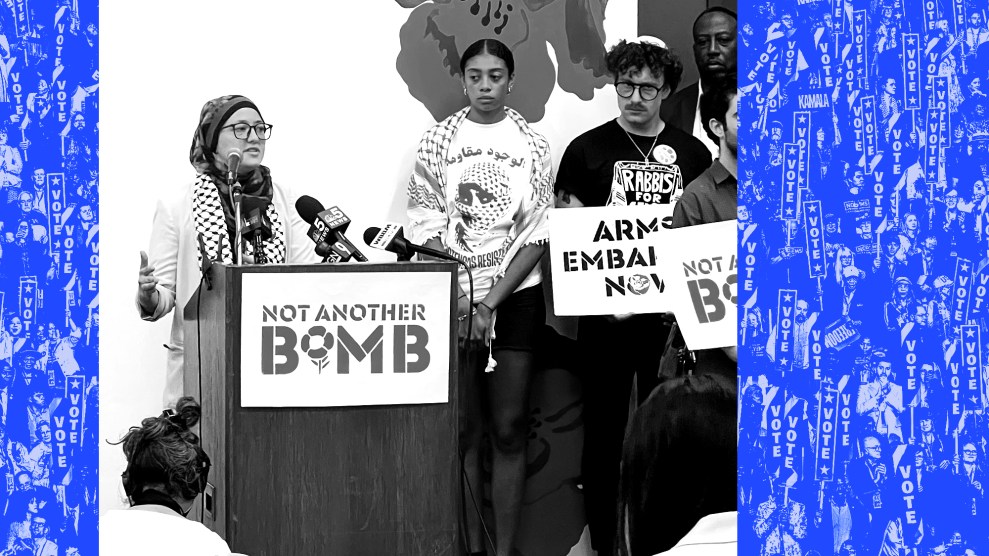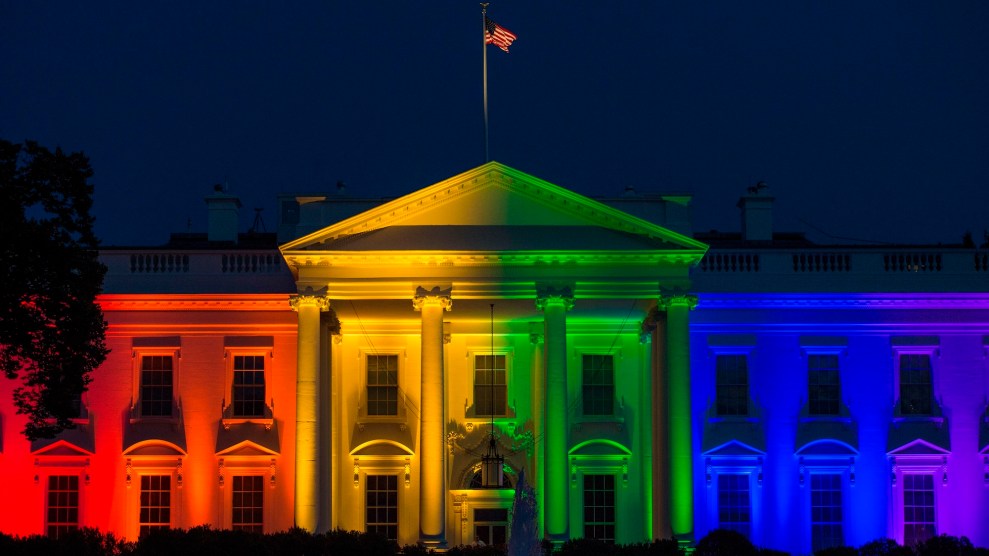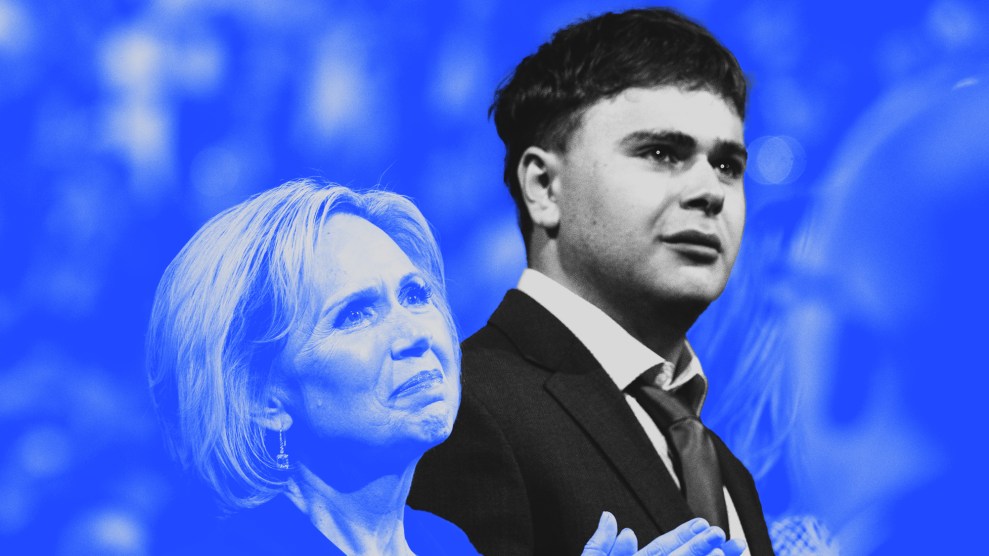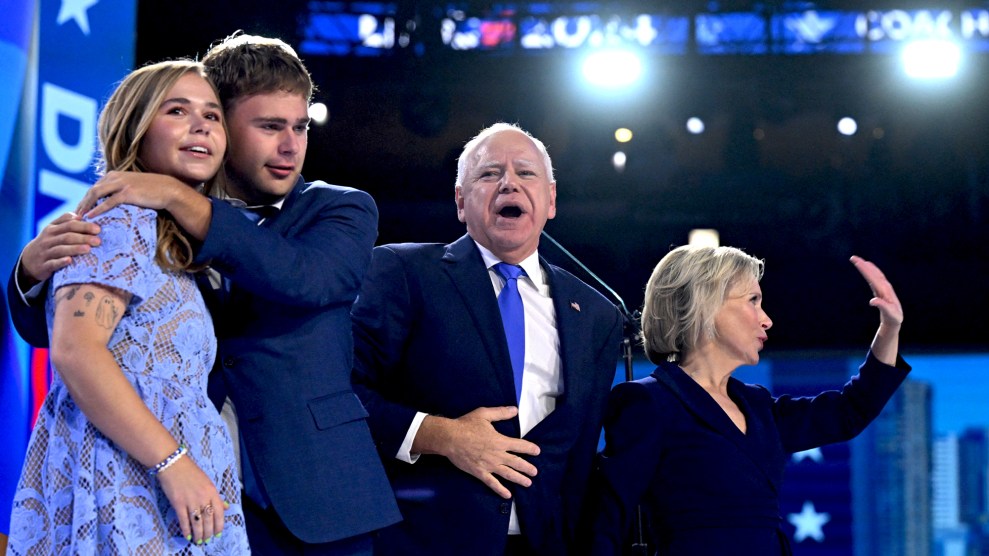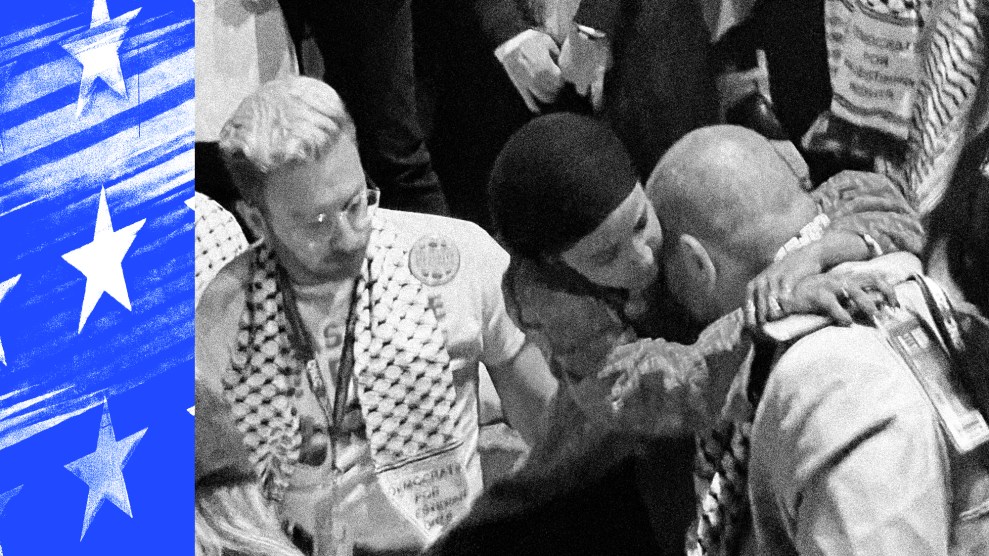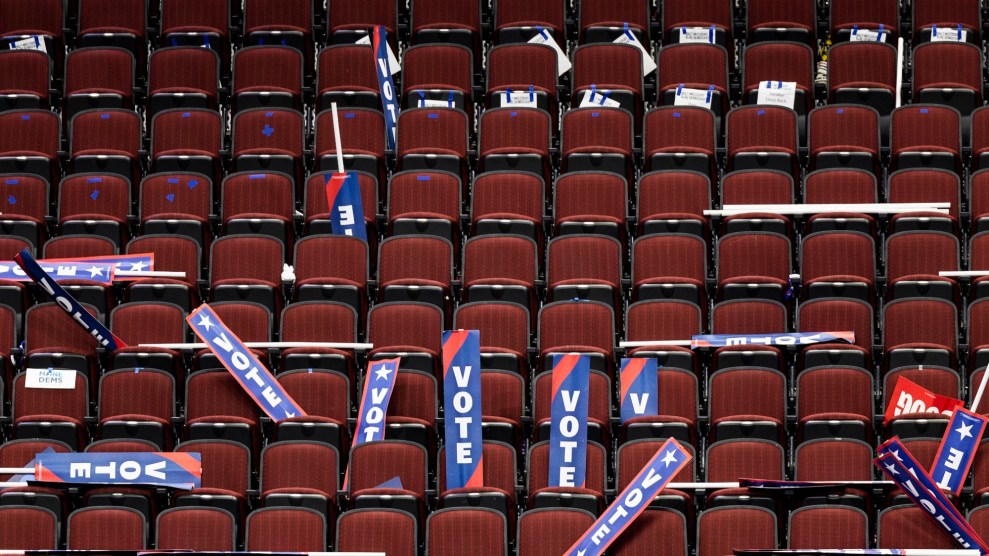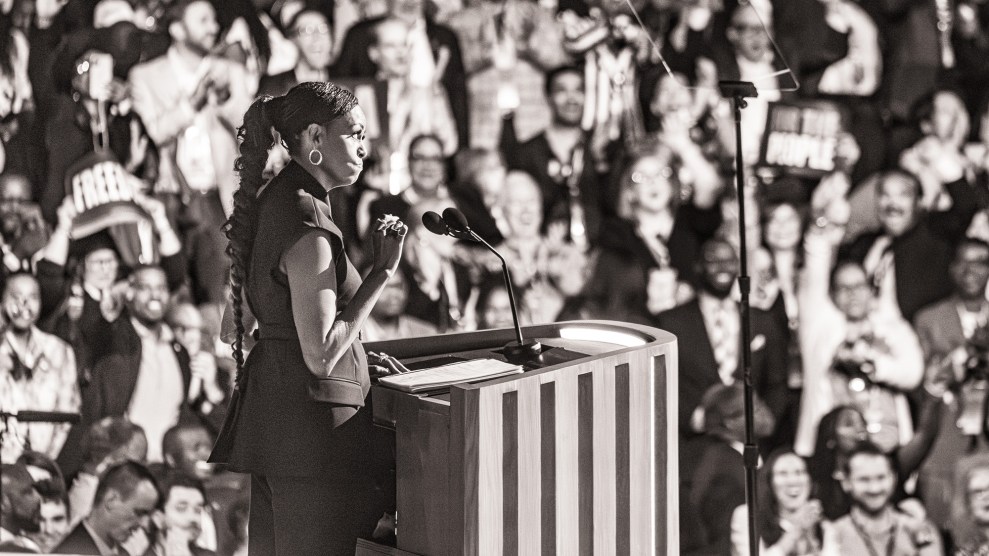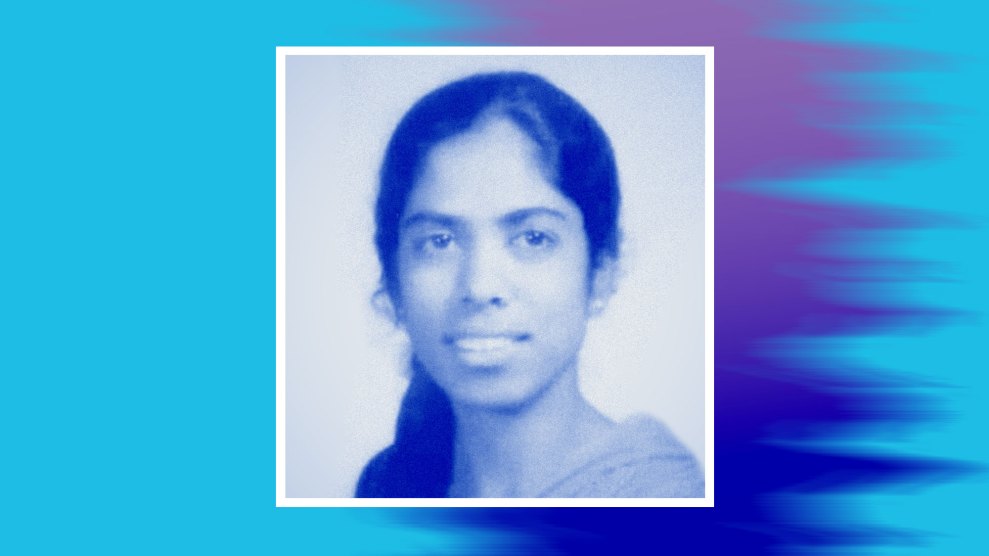
Shyamala Gopalan HarrisMother Jones illustration; Courtesy Kamala Harris Campaign
Shyamala Gopalan Harris did not believe in coddling. Pay her daughters, Kamala and Maya, an allowance for doing chores? “For what? I give you food. I give you rent,” scoffed the woman who would someday launch a million coconut memes. “If you do the dishes, you should get two dollars? You ate from the damn dishes!” Reward the future vice president of the United States—and possible future president—for getting decent grades? Ridiculous. “What does that tell you?” her mother chided as if I had disagreed. (I didn’t.) “It says, ‘You know, I really thought you were stupid. Oh, you surprised Mommy!’ No.”
When the breast cancer researcher and single mother had to work in her lab on the weekends, her daughters went with her, like it or not. “I’m not going to get a babysitter,” Dr. Harris laughed between bites of an utterly unmemorable salad at a downtown San Francisco bistro.
It’s been 17 years since I interviewed Kamala Harris’ mother, and 15 years since she died from colon cancer at the age of 70. I met her back in 2007, when I was an editor and writer at San Francisco magazine profiling her daughter—the city’s popular district attorney, who was running for reelection. Kamala was also helping her still-largely-unknown friend, the first-term Illinois Sen. Barack Obama, in his race for president. In a city that churned out political superstars—Pelosi, Feinstein, Newsom, Jerry and Willie Brown—Kamala Harris stood out for all the reasons she has energized previously dispirited Democrats as she hit the campaign trail this summer. She was sharp, empathetic, self-assured, funny. Highly polished but not too slick. The child of immigrants, she looked like the future. Her policies sounded like the future, too, progressive enough for her most liberal constituents but commonsense enough to appeal to the moderates who also wanted to feel safe.
Everyone told me, if you truly want to understand who Kamala Harris is and how she got that way, you need to talk to her mother. I wrangled a meeting with Dr. Harris, then a researcher at Lawrence Berkeley National Laboratory. She arrived at the restaurant off Union Square freshly manicured and coiffed, a ferocious bundle of energy and opinions in a tiny frame. If I wanted to know what made Kamala Harris tick, I could see it in this formidable woman—the same piercing intelligence, the same easy laughter, the same withering side-eye.
During that long-ago lunch, Harris’ mother explained why she hauled her two daughters, then still in elementary school, to her lab. “I had to go, we had to go,” she said. “And when they got there, I would make them do something”—maybe label test tubes or help with one of her experiments involving sex hormones and tumors. None of this did much to encourage artsy Kamala’s interest in science, though thanks to her mother she can knit, embroider, and crochet. “She painted, she drew, she did all kinds of stuff,” her mother recalled. “They couldn’t watch TV unless they did something with their hands—even though I controlled the shows as well.”
The contradictions of the 2007 Kamala Harris intrigued me: A 42-year-old Black and brown woman from the scruffy Berkeley-Oakland flats whose political rise was largely financed by rich white Pacific Heights socialites. A die-hard career prosecutor who often sounded like a social justice warrior. A wannabe thought leader whose brand was “smart on crime,” yet who squandered much of her early political capital by opposing the death penalty for a cop-killer. Harris was also maddeningly elusive, friendly and open even as she firmly latched the door and pulled down the shades on anything remotely private. All of which left me wondering: Who was this person? How could I distinguish the appealing packaging from the authentic self?
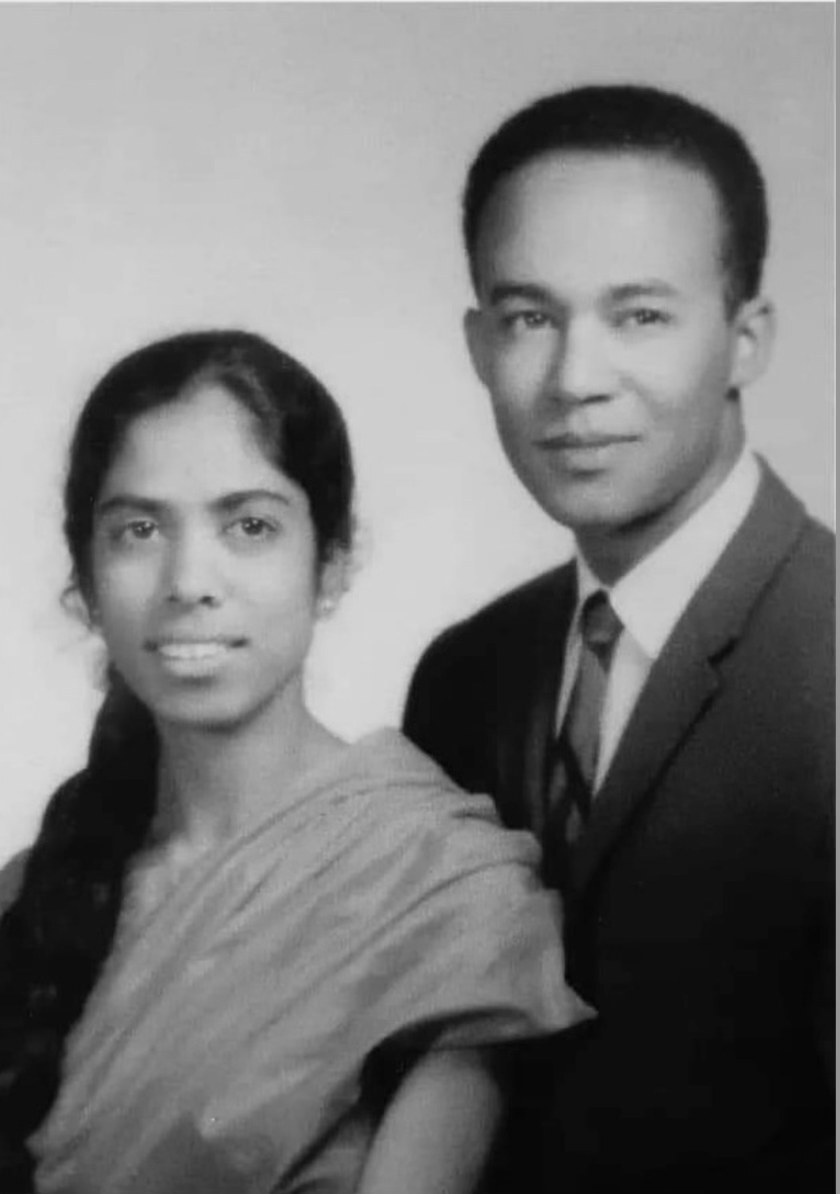
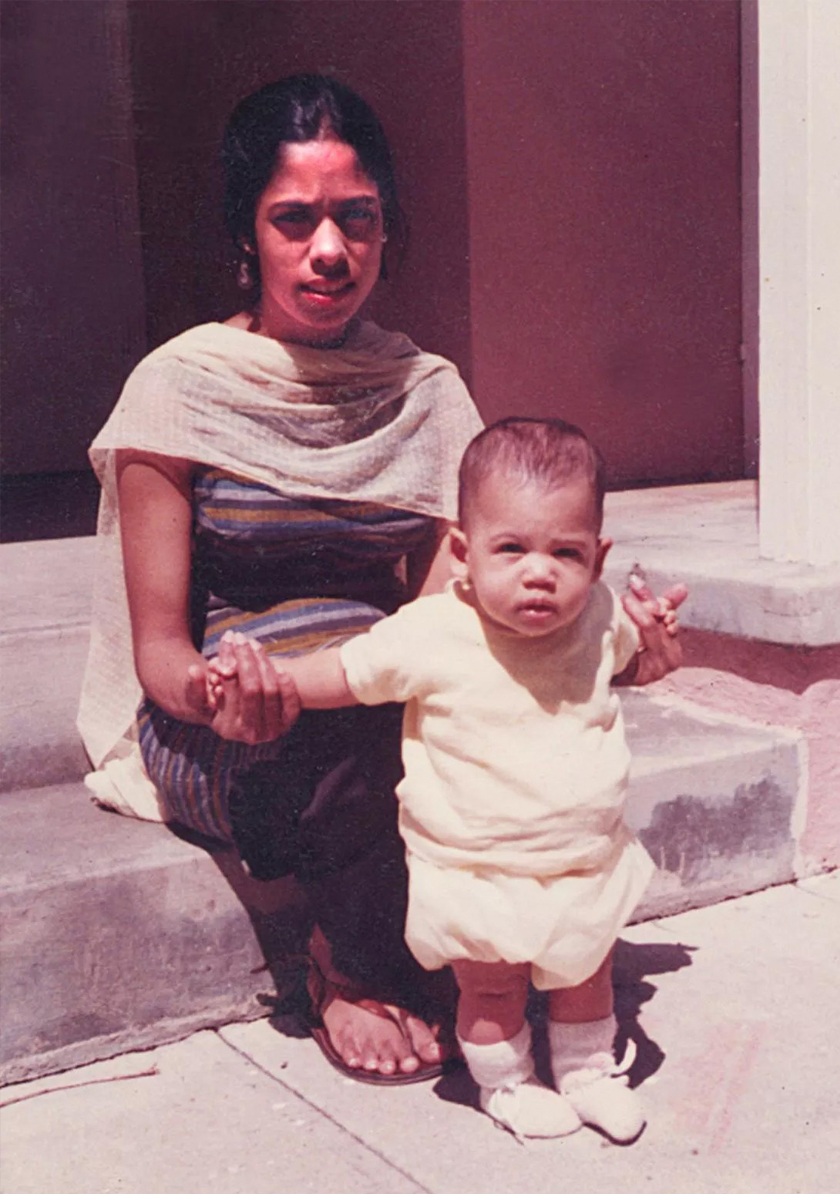
I could ask her mother.
Since our conversation, Shyamala’s daughter has been California’s attorney general, a US Senator, a failed presidential candidate, the vice president, and now the first woman of color to be nominated by a major political party for president. Throughout, she has often referred to her mother as her greatest influence and her True North. Shyamala and her aphorisms have become part of the Harris mystique. Consider the famous coconut story that’s all over TikTok. Harris was delivering remarks at a White House swearing-in ceremony for Hispanic leaders in May 2023 when she veered into one of those earnest tangents that I remember from her San Francisco days, reaching into her trove of goofy-momisms and pulling out zinger. “My mother used to—she would give us a hard time sometimes, and she would say to us, ‘I don’t know what’s wrong with you young people,” Harris recounted with a laugh. “You think you just fell out of a coconut tree?’”
I’m not sure what the vice president was talking about, though it had something to do with communities and context. I do know that it sounded exactly like something her mother would say. What I heard was love and yearning, a daughter honoring the person who, perhaps more than anyone else, helped shape her into what she has become, but who wasn’t there to see how it had all turned out. After Harris secured the presidential nomination, I started going through my computer files and came upon a transcript of my conversation with her mother. In rereading it, I realized that now, when millions of Americans may have the same questions I had all those years ago, revisiting my visit with Shyamala might provide some meaningful clues.
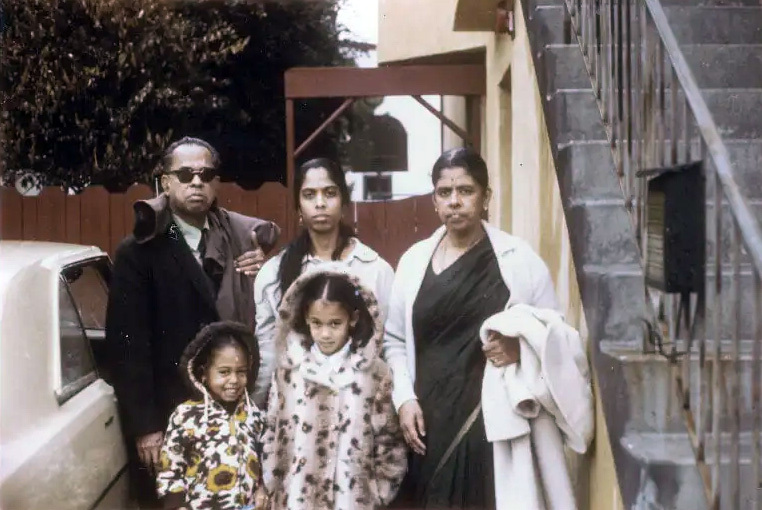
Shyamala Gopalan was raised in a progressive Brahmin family in southeast India in which everyone was expected to earn an advanced degree and have a high-achieving career in public service. Her father, once part of the Indian movement to gain independence, was a civil servant and diplomat. Her mother, betrothed at age 12, became a fierce feminist, sometimes taking to the streets with a bullhorn to talk to poor women about accessing birth control, Kamala later wrote. Having children whose professional lives were not focused on making money was a point of pride for Shyamala’s father. “Teachers, doctors, lawyers—these are supposed to be service professions,” Dr. Harris told me. “When you make money on people who require legal and medical help, you are taking advantage of the very vulnerable. That’s tacky.”
Coddling was out of the question. In 1958, after graduating from college in Delhi at 19, Shyamala headed to the University of California at Berkeley to earn her doctorate in nutrition and endocrinology. “My father just put me on a plane. There was not a soul I knew in the entire place. My family has done that with everybody—my sister, my brother, It was all normal.” After she completed her studies, the assumption was that she’d return to an arranged marriage in India.
But as Berkeley became the center of the Free Speech and anti–Vietnam War movements, that changed. Shyamala fell in love with a fellow grad student and activist, Jamaican-born Donald Harris, who eventually became an economics professor at Stanford. The birth of their daughters—Kamala in 1964, Maya in 1967—did not hinder Shyamala’s studies. She earned her PhD the same year Kamala was born and was working in her lab when her water broke. Should a political rally demand their attention, she and Harris strapped the girls into their strollers and took them along. In her 2018 book The Truths We Hold, Kamala tells the story of when she was a fussy toddler and her mother tried to soothe her. “What do you want?” Shyamala pleaded. “Fweedom!!!” Kamala supposedly replied.
After the couple’s 1971 divorce, Shyamala and the girls could have settled into one of the area’s vibrant South Asian enclaves. Instead, they gravitated to predominantly Black neighborhoods in Berkeley and Oakland. “I raised them in an African-American community, for a very special reason,” Shyamala told me: racism. “It doesn’t make a damn bit of difference if your color comes from India or African Americans, because this country is racist based on color.” Her children’s Indian identity was secure. Rooting them in the Bay Area’s Black community was an act of pride and protection, connecting them to the civil rights movement’s rich history but also schooling them in “what they need to know…to maneuver [in this country].” She added, “I’m the one who told them to do all that.”
“One of the first rules I taught my children is, don’t let anybody tell you who you are. You tell them who you are.”
Shyamala would not have been at all surprised by Donald Trump’s attacks on her daughter’s racial identity—he was exactly the kind of person she was teaching her children to stand up to—or by Harris’ deft dismissals of someone she considered beneath contempt. “If you don’t define yourself, people will try to define you,” Shyamala told me. “One of the first rules I taught my children is, don’t let anybody tell you who you are. You tell them who you are.”
Thanks to their far-flung extended family, her girls had many opportunities to escape the stultifying American attitudes towards race and gender. “When Kamala was in first grade,” Shyamala recalled, “one of her teachers said to me, ‘You know, your child has a great imagination. Every time we talk about someplace in the world she says, Oh, I’ve been there.’” Shyamala quickly set the teacher straight: “‘Well, she has been there!’ India, England, the Caribbean, Africa—she had been there.” In their travels, and in the examples of the matriarchs in their family, Kamala and her sister saw something that, in America of the 1960s and ‘70s, was relatively rare: women wielding power.
Another Shyamala life lesson: Don’t just sit on the sidelines and complain, and definitely don’t expect anyone to come to your rescue. In a 2007 interview for my profile, Harris told me that from the time she was little, “I’d come home with a problem, ‘Oh, Mommy, this happened, that happened.’” Instead of consoling her, “my mother’s first response was always, ‘What did you do?’” The young Kamala hated this. “You’re not coming to my defense! I want a mother to come to my defense!” Later she felt empowered. “If you can see where you fit into a problem, you can figure out where you could fit into a solution,” Harris told me. Perhaps as a result, she said, “I love problems, because they’re an opportunity to fix something— there’s nothing more gratifying.”
When I shared what her daughter had said, Dr. Harris offered a slightly different spin. “I wanted to know the situation. Always,” she confirmed. “But I’m not going to put on a Band-Aid when I don’t even know what the problem is. Because it could be a problem for a Band-Aid or it could be a problem for a [bigger] treatment.” And lest I missed her deeper motivation, she added, “I also think that it is patronizing from a mother’s point of view to underestimate the intelligence and the resilience of children.”
Dr. Harris brought the same tough love to the many students she mentored over the years. “It’s a very simple rule: You would not be in my lab unless I thought you were good,” she said. “Because I don’t believe in charity.” She believed they could succeed at whatever she threw at them, so they usually did. But not always. “My bottom line is just do it, and if you fall, I’ll pick you up. Because when else are you going to have this opportunity?” She could not abide young people being ruled by their laziness, or insecurity. “I’m not doing this because I’m being given millions of dollars to do this. It’s my time. And because my time is worth a lot of money, and I’m putting that time into you, you got to understand how good I think you are!” This, by the way, is the same hard-ass attitude her daughter has displayed as a boss and mentor—one of the reasons she’s sometimes been called “difficult” to work with. (Her mother’s description was “really strict.”) When it came to their expectations of the people around them, Shyamala said, they both wanted “the good stuff.”
Around 1976, Dr. Harris got a job at a research hospital at McGill University and moved the girls, then 12 and nine, to Montreal. Kamala hated being uprooted, but eventually she made some good friends. One of the recurring stories she tells is about what happened when she discovered that one of them was being molested by her father. “I said, ‘You have to come live with us.’ My mother said, ‘Absolutely.’”
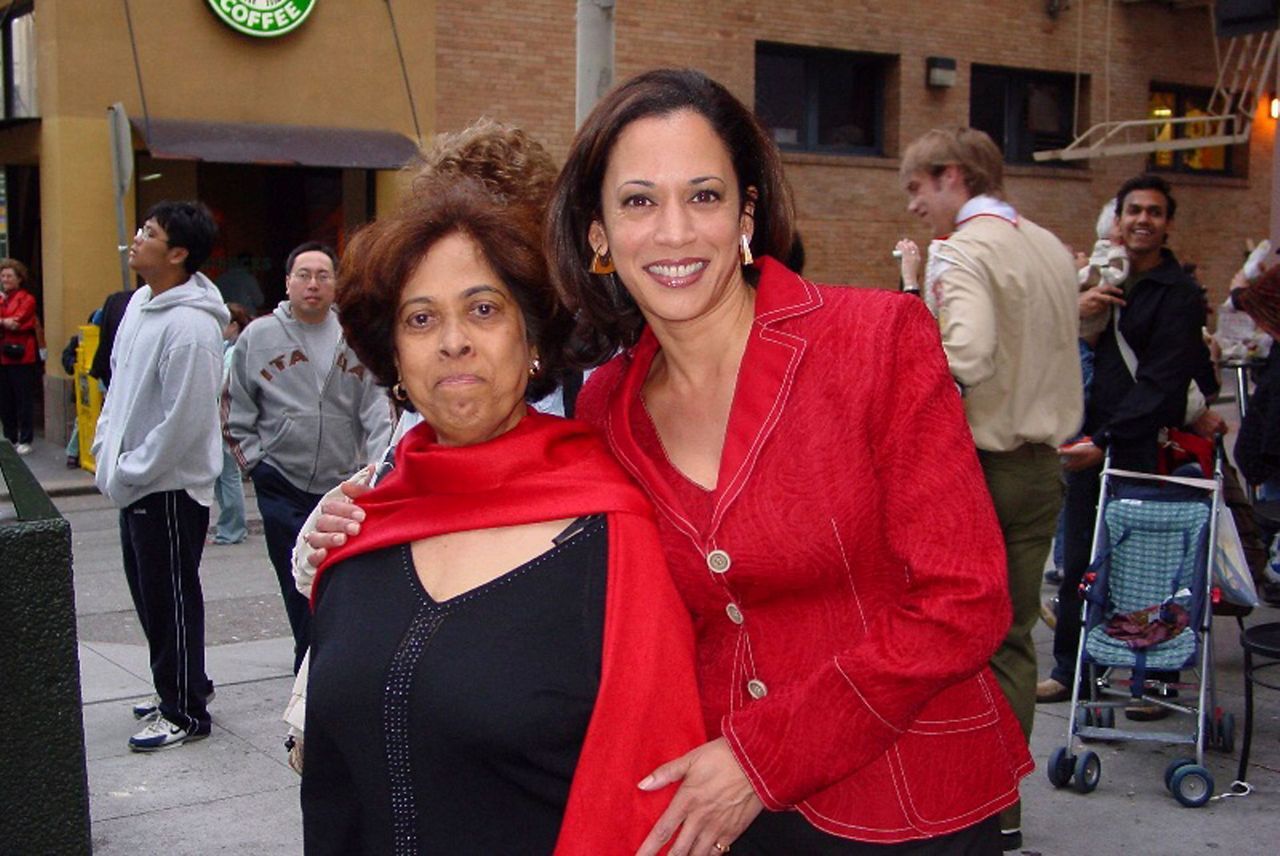
Kamala had long known she wanted to be a lawyer like her idol, Thurgood Marshall, attending Howard University like he had. Given her family’s progressive world view, the assumption was that her focus would be civil rights, perhaps as a defense attorney. (Years later, her sister and close adviser Maya Harris headed the Northern California office of the ACLU.) But after returning to the Bay Area for law school, Kamala surprised her mother by announcing she wanted to become a prosecutor and champion victims like her high school friend. “She told me, ‘If you’ve not been unjustly prosecuted, you don’t need a very hot-shot defense lawyer, do you? That is only necessary when the prosecutor doesn’t do their job.’” Kamala insisted she would be a different kind of prosecutor—one who understood that “a criminal is much more than the crime he or she commits,” Dr. Harris said. “Crime in a society doesn’t occur in a vacuum. Therefore you have to integrate law enforcement in the context of the society.” When you lose sight of the context, she said, “you lose sight of humanity.”
Then she launched into a story—another entry in the Kamala canon—about her daughter’s first job in the Alameda County DA’s office, which includes Oakland. An innocent bystander, a woman with kids, had been rounded up during a drug bust. If the woman didn’t get out that day, she’d be stuck in jail all weekend. Harris spent the afternoon looking for someone to approve the woman’s release, finally plunking herself down in a courtroom until the judge relented and signed the necessary paperwork. As Shyamala recalled it, Kamala was particularly distraught by the potential impact on the woman’s kids. “Because they are the future,” Shyamala said. “You don’t destroy them.”
“And people here think it is such a big deal that they’re going to nominate a woman?Please! I’m supposed to be impressed by that? No, I’m not.”
In 2007, campaign season was already in full swing and the Democratic frontrunner was Hillary Clinton. Shyamala didn’t have much to say about the presidential race, other than to grumble that the idea of a woman leading the ticket was hardly worth the hoopla. India’s Indira Gandhi had served as prime minister for almost 15 years. What about Margaret Thatcher? “And people here think it is such a big deal that they’re going to nominate a woman?” Dr. Harris said dismissively. “Please! I’m supposed to be impressed by that? No, I’m not.” As for Obama, who’d visited the Bay Area to fundraise with Kamala, “I didn’t spend that much time with him,” Shyamala told me. “He’s a great guy, but I don’t know him enough. But on my limited exposure to him, there is nothing about him that offends me.” If that seemed like faint praise—well, that’s who she was. “Anybody will tell you, I am not that easily impressed about anything.”
And now, former Secretary of State Clinton, and former President Obama, have given soaring speeches at the Democratic National Convention in praise of Kamala Harris, the Democratic presidential standard bearer. In November, Shyamala Harris’s oldest daughter could become this country’s first woman president.
In our long-ago conversation, it didn’t occur to me to ask Dr. Harris about the very American myth that anyone can grow up to be president. But it doesn’t sound like something she would have believed. Certainly she never pushed her daughters in any particular direction, with any particular goal. “To some extent, I believe that life takes you,” she told me, waxing philosophical. “You let life take you without putting up enormous resistance.”
All Shyamala Harris wanted to do was to give her girls the emotional tools—toughness and discipline and a deep-down belief in themselves that came from knowing they were truly loved—to take on whatever life threw at them. In that, she seems to have succeeded. “What my children tend to do, I have noticed, is when they see a challenge in front of them and they feel they can take it, they will go for it,” she said proudly. “Because [if] you’re affirmed in that manner, you think, ‘I’m not going to be afraid…. I can do this.’”

